
Performances or experimental lectures on a stage
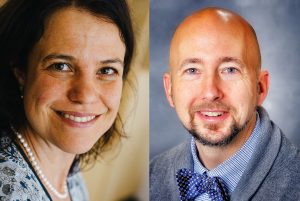
Let’s Build a Sustainable Future – Together!
Friday, 1 November, 9:00-10:00 | Auditorium
Gerald Decelles III – Skagerak International School – Norway
Ulrike Englert – Willibald-Gluck-Gymnasium – Germany
Climate change and conservation are topics that must move us, and especially our youth, to action. In our joint teaching project, students from two countries, Norway and Germany, deal with the subject of energy-efficient construction and jointly developed and implemented a model of a modern school building.
Why a school? Every student knows their school and has opinions about the ways to make it better. Students learn about energy efficiency and apply this knowledge to their concept of a school. From their familiar learning environment, students were given benchmarks for an energy-efficient school building and were tasked to come up with a model. The Norwegian students used software for modelling energy efficient buildings. The German students simulated building controls with Arduino. Collaboration between the students was through file storage for the sharing of resources.
We would like to introduce you to our project and describe our experiences. Our project is about changing students’ attitudes toward the challenges that come with climate change and what is possible working together. Let’s build an energy-efficient school building – together across borders!
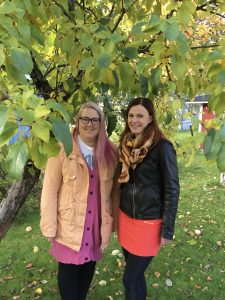
Kalevala Goes Science
Friday, 1 November, 9:00-10:00 | Auditorium
Johanna Eskelinen – Joutsan yhtenäiskoulu – Finland
Päivi Mustalampi – Joutsan yhtenäiskoulu – Finland
Since the students always read and write at school, mother tongue and literature play a secondary role in interdisciplinary learning modules studies. We decided to do this the other way: literature comes first and we look at it with a scientific view point. We chose Kalevala, Finland’s national epic, because all the pupils study it during their final school year anyway.
We studied the main parts of the story and chose 13 subjects for the projects. Every group made up a scientific question based on the plot. They continued the work by finding theoretic information and doing practical research. The work was put on the website with some extras.
Can you get pregnant by eating a lingonberry? Why is the golden woman cold? Students were researching these and many other questions. We’ll present our project, working phases, planning and methods, which we used. We’ll also show the students’ results, like the chemistry of lingonberries. On this stage performance you’ll see how to do scientific research in secondary school using stories from a fictive novel.
Inspiring Life
Saturday, 1 November, 17:00-18:00 | Auditorium
Responsible teacher: Honorata Pereira – Eptoliva School – Portugal
Performance director teachers: Ana Morais and Liliana Rodrigues – EPTOLIVA School – Portugal
On the 15th October 2017, Eptoliva School lived the worst tragedy in its 30 years of history, with many of its students been caught by the vast fires that happened in Portugal, either as victims, firefighters or both.
This stage performance tells the story of the students´ feelings and actions after the fires and shows how school projects highlighted their resilience and their ability to endure the greatest adversity turning what hurt them into a toll that strengthened their character. The project process led students to clearly identify the problem, to face its main issues, to understand and overcome real problems against all odds, improving them as individuals and as members of a community.
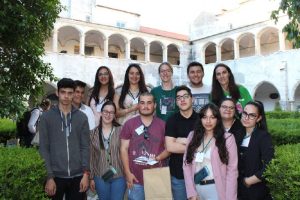
Students on stage:
José F. Cardoso
Ana Campos
Rafaela Simões
Diana Ferreira
Diogo Peres
Tatiana Ferreira
Ângela Nogueira
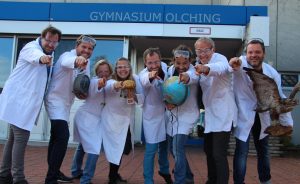
Brain of Olching – The Scientific Castingshow
Saturday, 2 November, 9:00-10:00 | Auditorium
Thomas Drexler, Florian Gärtner, Martin Hölzel, Carola Müller, Tanja Neufeld, Miriam Plank, Oliver Schuppach – Gymnasium Olching – Germany
“The Brain of Olching” is a scientific castingshow and is literally taking science to the stage. Based on the TV show “The Voice of Germany” the best scientific idea for a sustainable world of tomorrow is wanted. During a school year, students present their ideas in front of a great audience and work with their coach to bring their ideas to life.
Passion for science, a new teacher role, appreciative interaction with the participants, entertainment and high scientific demands are the principles on which the show is based.
This lecture will give a taste of what can happen if we redefine traditional teacher and student roles: It’s the science event of the year!
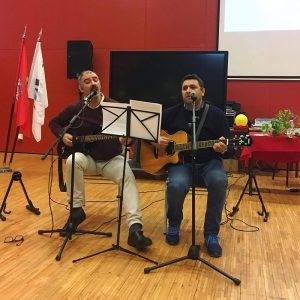
SoS – Sounds of Science
Sunday, 3 November, 9:00-10:00 | Auditorium
Mário Correia – Escola Secundária Adolfo Portela – Portugal
Álvaro Folhas – Escola Secundária Marques Castilho – Portugal
Music will always be a powerful vehicle for knowledge and one for which youth is most sensitive. It is therefore important to use music to open the doors of thought and add joy to learning.
Our work has two parts: In the first part, sound is explored as a physical entity, exploring the propagation and characteristics of its waves, using both physics and mathematics approaches, adding waves and perceiving the physical manifestations aligned with the mathematical process involved. For this, we will use musical instruments, tuning forks, sensors and simulators, in order to allow to experience mathematics and physics in an interdisciplinary way. A second part consists of taking the instruments and, on stage, presenting unpublished songs about curricular subjects, or about the importance of learning science and also to present our work on it.
Special Performances and Talks
Exploring Mars: An Adventure of a Lifetime
Friday, 1 November, 9:00-10:00 | Auditorium
Gernot Groemer – Analog Astronaut, (OeWF) Austrian Space Forum
Planet Mars is one of the most promising candidates for the search for life in the Solar System: European, US, Indian and Japanese spacecrafts investigate its surface and atmosphere and a crewed mission is in reach within the next 2-2-3 decades. In an extraordinary expedition, researchers of the Austrian Space Forum – in partnership with teams from 25 nations – simulated aspects of such a human Mars mission in the Sultanate of Oman. Dr. Gernot Groemer led this expedition and provides a first-hand account of the science and expedition challenges of such an endeavour.
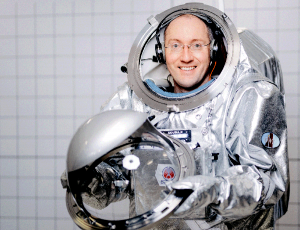 Gernot Groemer
Gernot Groemer
Born 1975, masters degree in astronomy, PhD in exploration astrobiology (Leopold-Franzens University, Innsbruck), International Space University summer school (Houston/Texas), lecturer at the International Space University and the University of Innsbruck. Member of the Space Generation Advisory Council (Board of Mentors). Flight Crew 37th ESA Parabolic Flight Campaign. Programme Management Group AustroMars and PolAres.
3 Piano Pieces
Friday, 1 November, 17:00-18:00 | Auditorium
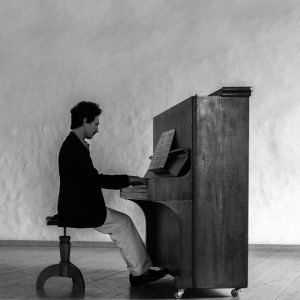 Philippe Kobel – Pianist, astrophysicist and teacher
Philippe Kobel – Pianist, astrophysicist and teacher
- Andante Spianato and Grande Polonaise brillante Op. 22 (F. Chopin)
- Bajo un mismo cielo (P. Kobel)
- Open Up (P. Kobel)
Philippe Kobel
Philippe Kobel is a pianist and astrophysicist who loves to share. He studied at the Geneva conservatory under the guidance of the argentinian maestro Luis Ascot. After completing a PhD in solar physics, he launched in 2009 GalileoMobile, an itinerant education programme for which he shared astronomy with kids in South America, India and Ouganda; GalileoMobile has now 10 years and still running. Today, Philippe passionately teaches physics in a high school of Switzerland.
Listening to Einstein’s Universe: the Dawn of Gravitational-Wave Astronomy
Saturday, 2 November, 9:00-10:00 | Auditorium
Martin Hendry – University of Glasgow
Gravitational waves are the ripples in spacetime predicted more than a century ago by Albert Einstein and produced by the most violent events in the cosmos: exploding stars, colliding black holes, even the Big Bang itself. Their discovery has opened a whole new window on the Universe and is bringing fresh insights on some of the biggest scientific questions of our time: from measuring the expansion of the Universe to understanding how precious metals like gold and silver were formed. Join University of Glasgow astronomer Professor Martin Hendry as he tells the inside story of how gravitational waves were detected for the very first time, by the most sensitive scientific instruments ever built, and what they are telling us about our place in the cosmos. Learn about the amazing technology behind these discoveries and very bright future that lies ahead for this exciting new field.
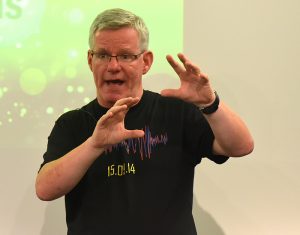 Professor Martin Hendry
Professor Martin Hendry
Professor of Gravitational Astrophysics and Cosmology at the University of Glasgow, where he is also currently Head of the School of Physics and Astronomy. Martin is a senior member of the LIGO Scientific Collaboration (LSC) which, together with their colleagues in the Virgo Collaboration made the first ever direct detection of gravitational waves in 2015 – a discovery that was awarded the 2017 Nobel Prize for Physics. Martin also co-chairs the global Advocacy and Outreach Group of the LISA Consortium, responsible for preparing the scientific and technological case for the LISA spaceborne gravitational-wave mission, set for launch in the mid-2030s. His main current research interests are in the new field of “multi-messenger” astronomy, combining the latest information from observations in both electromagnetic waves (i.e. light) and gravitational waves. Martin is a Fellow of the Institute of Physics, the Royal Astronomical Society and the Royal Society of Edinburgh. In 2015 he was awarded the MBE by Queen Elizabeth for his services to the public understanding of science.
Mighty Valentina and the Power of Books
Saturday, 2 November, 9:00-10:00 | Auditorium
Andreia Nunes – Writer, Higher Education Technician
Mighty Valentina is a fictional story, inspired by the first woman astronaut to go to Space: Valentina Tereshkova. Andreia Nunes wrote the text and Rachel Caiano conceived the illustrations.The fictional story of Mighty Valentina allows us to enter the child’s imagination and create an identification with the character. The story hopes to inspire many more children and girls that the sky is not the limit!
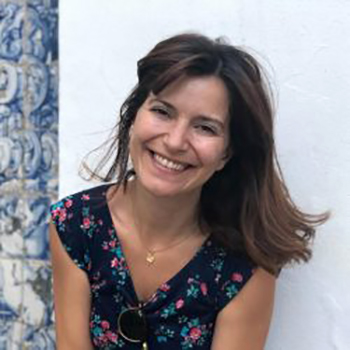 Andreia Nunes
Andreia Nunes
Holds a Bachelor’s Degree in Education Sciences and a Post-Graduate Degree in Prevention Gender Violence in Schools and Family. She recently completed her Master’s Degree in Entrepreneurship and Studies in Culture at ISCTE-IUL (Lisbon), conducting research on Gender Stereotypes in Award-Winning Children’s Books. Since 2009, she collaborates with various NGO as a Higher Education Technician, acting in schools, promoting Gender Equality and Preventing Gender Violence among children, young people, teachers and other strategic publics. She currently collaborates with UMAR – União Mulheres Alternativa e Resposta, in the ART’THEMIS + Project, conducting sessions in Lisbon schools and participating as a researcher in the National Study of Dating Violence that this NGO carries out every year. Thanks to this privileged contact with children and young people, she concluded the same that the various studies – astronomy, astrophysics, professional careers and space – in general, seem to continue to be “boys’ thing”. Faced with the scarcity of material to work on the curiosity of these subjects among the children’s public, particularly among the girls, she embarked on the mission to write a children’s book about the first woman in Space, a fictional story inspired by Valentina Tereshkova, the first female astronaut, with the publishing house Caminho.
Airbus Foundation Discovery Space: a global approach for aerospace engagement
Saturday, 2 November, 17:00-18:00 | Auditorium | Open to General Public
Didier Laval – Leader of the global aerospace engagement campaign for the Airbus Foundation
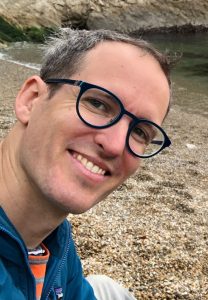 What are the new approaches to engage children with aerospace?
What are the new approaches to engage children with aerospace?
Linking 3D-design and hands-on activities, the Airbus Foundation Discovery Space offers an innovative way to explore the current aerospace challenges, fostering creativity along with knowledge building and collaborative practices.
Didier Laval
Is leading a global aerospace engagement campaign for the Airbus Foundation. Initially trained as an engineer and theatre director, he has been working in the field of non-formal education for 15 years, with science centres (Palais de la Découverte, Cap Sciences), science engagement networks (Ecsite), and Universities (University of Bristol, IAE Bordeaux). Director of the UK-based company Culture Instable, he creates engagement experience and builds international collaborations in science, heritage and culture at large.
Google Earth Outreach Presentation
Saturday, 2 November, 17:00-18:00 | Auditorium | Open to General Public
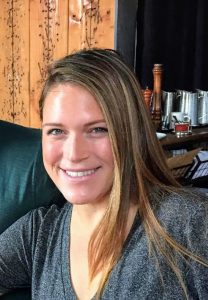 Emily Henderson – Program Manager of Google Earth Outreach
Emily Henderson – Program Manager of Google Earth Outreach
Emily Henderson
Has worked at Google since 2010, for the entire time on geo-related programs. For the past 5 years, she has worked as a Program Manager on the Google Earth Outreach team focused on sharing Google’s mapping tools with teachers and students around the world. Many of the world’s toughest challenges will only be resolved through applied geospatial knowledge. By focusing on the children of today, she hopes to leverage Google Geo technology to drive geoliteracy and compassion as a fundamental learning and life skills in global education, building future generations of Earth advocates.
What Can Neuroscience And Education Learn From Each Other
Saturday, 2 November, 17:00-18:00 | Auditorium | Open to General Public
André Mendonça – Researcher, Champalimaud Center for the Unknown
Our culture is based almost entirely on the sharing of acquired knowledge. In modern societies we first learn in direct contact with our family and friends and are later taught by mentors, in schools, alongside a group of peers. What dictates the value of such shared information? Are we trying to convey the knowledge accumulated through centuries of civilization? Or are we teaching the ability to explore new ideas, to think creatively and independently, and thus generating functional members of a society? Ultimately, what is the goal of education?
Learning is the mechanism through which we gain an education. But what are the biological bases behind such learning? How do we learn and acquire new knowledge, new skills? How can one constantly juggle between new actions with old habits? How flexible/plastic is our brain? What can Neuroscience and Education learn from each other?
These, and other, questions will be explored in light of a collection of neuroscience studies, conducted by neuroscientists all over the world, including work being developed at the Champalimaud Centre for the Unknown, in Lisbon, Portugal.
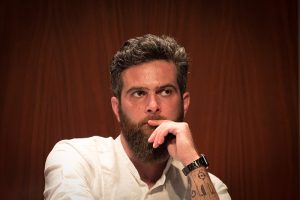 André Mendonça
André Mendonça
Physics undergrad with a Masters in Biology and a PhD in Neuroscience. However, André considers himself none of the above, just an avid enthusiast of science. He has always been interested in knowledge and how to facilitate communication, learning and education. His PhD, developed at the Champalimaud Center for the Unknown, focused on decision-making and the question of how organisms learn to categorize perceptions. Later, in 2017, he moved to New York University, to study how the brain generates predictions given its prior knowledge. In parallel to his career as a neuroscientist, André got involved in science education initiatives. In 2018, he was invited by the Gulbenkian Foundation to be part of the team behind the “Brain: wider than the sky” exhibit. There, André also coordinated the school visits, with over 15.000 students in three months. André is now the project manager of an exciting new science education project that brings together Metacognition, Neuroscience and Machine Learning, funded by the BPI Fundação la Caixa and the Champalimaud Foundation.
